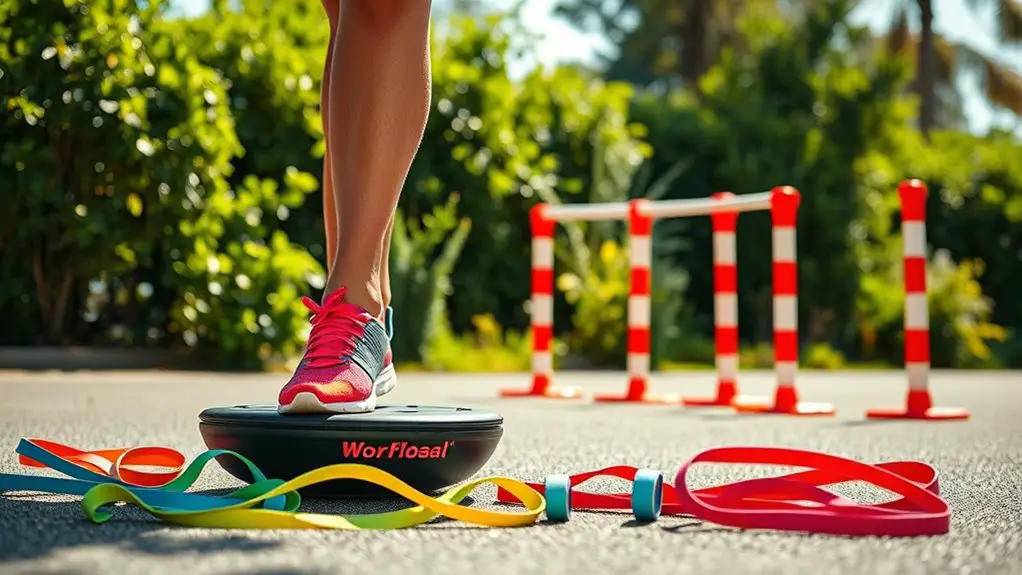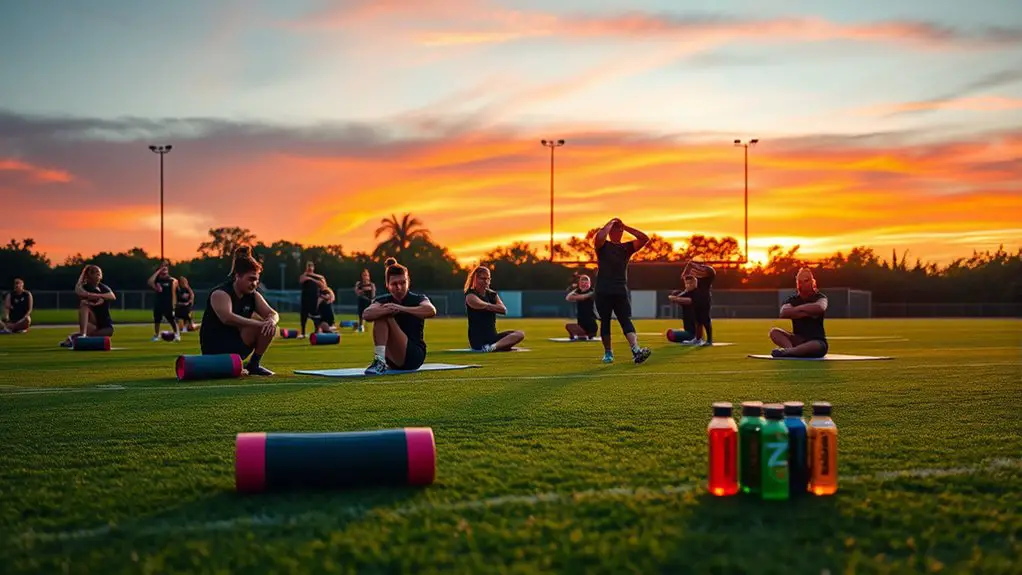To recover faster after intense matches, prioritize hydration by replenishing lost fluids and electrolytes. Focus on nutrition; consume a mix of protein and carbs right after your game. Incorporate active recovery with light activities and stretching to keep your muscles loose. Make quality sleep a priority for muscle repair, and consider foam rolling or massage therapy to relieve tension. Don't forget mental recovery techniques to boost your focus and resilience. There's more to explore on optimizing your recovery!
Prioritize Hydration
When you've just pushed your limits in an intense match, it's crucial to prioritize hydration to aid your recovery. Your body needs to replenish lost fluids, and neglecting this can lead to fatigue and hinder your performance. Implementing effective hydration strategies is key. Start by drinking water immediately after the match, and consider electrolyte-rich drinks to restore your electrolyte balance. These drinks not only hydrate but also replace the minerals you lost through sweat. You might want to experiment with coconut water or sports drinks that contain sodium, potassium, and magnesium. Don't wait until you're thirsty; drink regularly throughout the day to maintain ideal hydration levels. Additionally, monitoring urine color can help you assess your hydration status and ensure you're adequately replenished.
Focus on Nutrition
After focusing on hydration, the next step in your recovery is to concentrate on nutrition. Fueling your body right can make all the difference in how quickly you bounce back. Pay attention to nutrient timing; eating the right foods at the right times can enhance recovery. Within 30 minutes post-match, aim for a meal that includes protein and carbohydrates to replenish energy stores and support muscle repair.
Consider your meal composition carefully. Incorporate lean proteins like chicken or tofu, complex carbs such as quinoa or sweet potatoes, and plenty of colorful veggies. These choices keep your body nourished and ready for the next challenge. Don't shy away from healthy fats—avocado and nuts can play a role too. By prioritizing balanced meals, you empower yourself, ensuring you recover faster and feel energized for your next match. Embrace nutrition as a key player in your recovery journey! Additionally, consuming adequate protein intake after exercise is crucial for reducing soreness and accelerating recovery time.
Incorporate Active Recovery
Active recovery is essential for bouncing back after intense matches. It helps reduce muscle soreness and speeds up your overall recovery process. By timing your sessions effectively and using the right techniques, you can maximize the benefits of your active recovery routine. Incorporating activities that enhance blood flow and recovery improves nutrient delivery and aids in muscle repair.
Importance of Active Recovery
The body's ability to bounce back from intense matches hinges considerably on the practice of active recovery. Engaging in dynamic movements keeps your muscles loose, promotes blood flow, and accelerates the healing process. Here are three key recovery benefits you'll experience:
- Reduced Muscle Soreness: Active recovery helps flush out lactic acid, minimizing post-match discomfort.
- Enhanced Flexibility: Incorporating gentle stretches and movements can improve your range of motion, making you more agile in your next match.
- Improved Mental Clarity: Taking time for active recovery clears your mind, allowing you to refocus and re-energize for future challenges.
Embrace active recovery, and you'll notice the difference in your performance and overall well-being.
Effective Recovery Techniques
While you might feel the urge to rest completely after an intense match, incorporating effective recovery techniques can greatly enhance your performance. Instead of zoning out, consider engaging in light activities like walking or gentle stretching. These active recovery methods keep your body moving and promote blood flow, which helps with muscle repair. Don't forget to incorporate breathing exercises; they can ease tension and lower your heart rate, making you feel more centered. Pair these with relaxation techniques, such as meditation or progressive muscle relaxation, to reduce stress and enhance recovery. By embracing these practices, you not only recover faster but also prepare yourself for your next challenge, allowing your body to feel rejuvenated and ready for action.
Timing Your Sessions
Incorporating active recovery techniques into your post-match routine can markedly influence your overall recovery strategy. By timing your sessions right, you can balance session frequency and session intensity to guarantee peak recovery. Here are three key points to take into account:
- Post-Match Cool Down: Engage in low-intensity activities like walking or light cycling right after your matches to help reduce soreness.
- Active Recovery Days: Schedule sessions that focus on mobility and flexibility throughout the week, allowing your body to recover while staying active.
- Listen to Your Body: Adjust session frequency based on how you feel. If you're fatigued, lower the intensity or take an extra rest day.
Get Quality Sleep
Getting quality sleep is essential for your recovery after intense matches. It's not just about how long you sleep, but also the quality and your sleep hygiene practices that matter. Let's explore how to optimize your sleep to guarantee you're ready for your next challenge. Quality sleep is crucial as it facilitates muscle repair and growth, ensuring you are fully prepared for your next challenge.
Importance of Sleep Quality
Sleep quality plays an essential role in your recovery after intense matches, as it directly affects your physical and mental performance. To optimize your sleep, focus on these key aspects:
- Sleep Environment: Create a comfortable and dark space. Your bedroom should be cool, quiet, and free from distractions to promote restful sleep.
- Sleep Consistency: Go to bed and wake up at the same time every day. This helps regulate your body's internal clock, making it easier to fall asleep and wake up refreshed.
- Limit Stimulants: Avoid caffeine and electronics before bed. These can interfere with your ability to fall asleep and diminish the quality of your rest.
Prioritizing quality sleep is your ticket to recovering faster and performing better on the field.
Sleep Hygiene Practices
Although you might think that any amount of sleep will suffice, establishing good sleep hygiene practices is essential for ensuring you get quality rest. Start by creating a sleep environment that promotes relaxation. Keep your bedroom cool, dark, and quiet—free from distractions. Consider blackout curtains or a white noise machine to enhance your space.
Next, focus on a consistent bedtime routine. Wind down with calming activities, like reading or gentle stretching, and try to go to bed and wake up at the same time each day. Limit screens before sleep, as blue light can disrupt your natural rhythms. By prioritizing these practices, you're not just sleeping; you're giving your body the freedom to recover fully and perform at its best.
Optimal Sleep Duration
Quality rest isn't just about creating a suitable environment; it also involves understanding how much sleep your body truly needs. Ideal sleep duration can enhance recovery and performance. Here's how to get it right:
- Know Your Sleep Cycles: Aim for 7-9 hours per night, allowing your body to complete several sleep cycles.
- Create a Restful Sleep Environment: Keep your room dark, cool, and quiet to promote deeper sleep.
- Listen to Your Body: If you feel sluggish during the day, consider adjusting your duration.
Utilize Stretching and Foam Rolling
When you push your body to its limits during intense matches, incorporating stretching and foam rolling into your recovery routine can make a significant difference. Dynamic stretching before your matches keeps your muscles flexible, while post-match foam rolling aids in myofascial release, helping to release tension and improve blood flow. These practices not only speed up recovery but also enhance your overall performance. Additionally, prioritizing rest and recovery is essential for optimal muscle repair and performance.
| Type of Stretching | Benefits | Foam Rolling Techniques |
|---|---|---|
| Dynamic Stretching | Increases flexibility | Quads and Hamstrings |
| Static Stretching | Enhances muscle recovery | Calves and Glutes |
| Active Stretching | Improves range of motion | Back and Shoulders |
| Ballistic Stretching | Prepares for intense activity | IT Band and Hip Flexors |
| PNF Stretching | Boosts strength and flexibility | Full Body Roll |
Embrace these techniques to feel freer and stronger on the field!
Consider Massage Therapy
After stretching and foam rolling, another effective way to enhance your recovery is through massage therapy. It's not just a luxury; it's a powerful recovery technique that can bring you back to peak performance. Here are some key massage benefits:
- Improves Blood Circulation: Enhanced blood flow helps deliver nutrients to your muscles, speeding up recovery.
- Reduces Muscle Tension: Targeting tight areas helps relieve soreness and promotes relaxation, making you feel lighter.
- Boosts Flexibility: Regular massages can increase your range of motion, keeping you agile and ready for action.
Incorporating massage therapy into your routine can elevate your recovery game. Additionally, understanding the role of rest days is crucial for maximizing your overall training effectiveness. Whether you opt for a professional massage or try self-massage techniques, the results can be transformative. Embrace this opportunity to give your body the care it needs, and you'll find yourself bouncing back faster and feeling more liberated in your performance.
Mental Recovery Techniques
While physical recovery is crucial, mental recovery techniques are equally important for restoring your focus and motivation after intense matches. To regain your mental edge, try incorporating visualization techniques into your routine. Picture yourself executing plays flawlessly, feeling the adrenaline and confidence that come with success. This can help reinforce positive outcomes in your mind.
Mindfulness practices are also essential. Spend a few minutes each day in quiet reflection, concentrating on your breath or observing your thoughts without judgment. This can ground you, clearing your mind of distractions and reducing anxiety.
Engaging in these methods not only enhances your mental resilience but also empowers you to embrace the freedom to perform at your best. Remember, recovery isn't just about the body; it's about nurturing your mind to release your full potential in every match. Embrace these techniques and watch your performance soar! Additionally, understanding the root causes of performance anxiety can help you manage anxiety and improve your overall mental clarity.
Frequently Asked Questions
How Long Should I Rest After an Intense Match?
After an intense match, think of your body as a finely tuned engine that needs a cool-down. Generally, you should consider a rest duration of at least 24 to 48 hours, depending on your match intensity. This allows your muscles to recover and rebuild. However, listen to your body—if it's still feeling heavy, don't hesitate to take an additional day or two. Freedom lies in understanding your own limits and respecting them.
Can I Use Ice Baths for Recovery?
Absolutely, you can use ice baths for recovery! They offer several ice bath benefits, like reducing inflammation and speeding up muscle recovery. If you're looking for effective recovery techniques, incorporating ice baths into your routine can help you bounce back faster after intense workouts. Just remember to limit your time in the ice and listen to your body. Embracing this method can give you the freedom to perform at your best!
What Supplements Aid in Recovery?
Did you know that athletes who optimize protein timing can improve recovery efficiency by up to 30%? To enhance your recovery, consider including protein supplements right after your workouts. Pair that with effective hydration strategies—aim for at least 16 to 24 ounces of water for every pound lost during exercise. By focusing on these aspects, you'll not only feel better but also regain your freedom to perform at your best in no time!
How Often Should I Get a Massage?
Getting a massage regularly can really enhance your well-being. For deep tissue massages, aim for once every two to four weeks, depending on your activity level and stress. These sessions can help relieve tension, improve circulation, and promote relaxation, making you feel more free to enjoy life. Listen to your body; if you're feeling particularly sore or stressed, don't hesitate to book an extra session for those incredible massage benefits!
Are There Specific Breathing Exercises for Recovery?
Imagine the calm after a storm, where the chaos fades and clarity emerges. For effective recovery, you can incorporate specific breathing techniques into your routines. Deep diaphragmatic breathing helps oxygenate your muscles, promoting relaxation and reducing tension. Alternate nostril breathing can balance your energy, while box breathing helps center your mind. By embracing these practices, you'll not only enhance your recovery but also feel a newfound freedom in your body and spirit.




